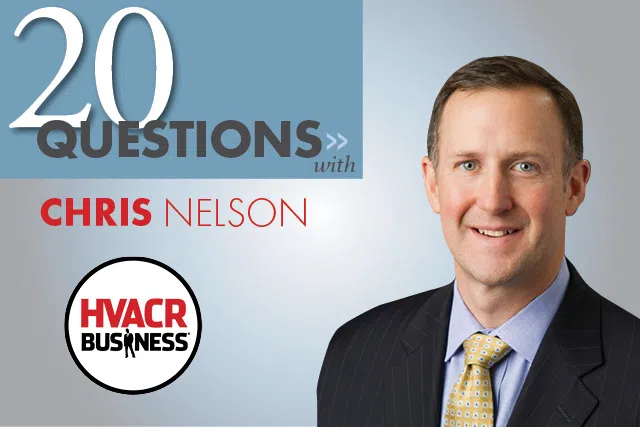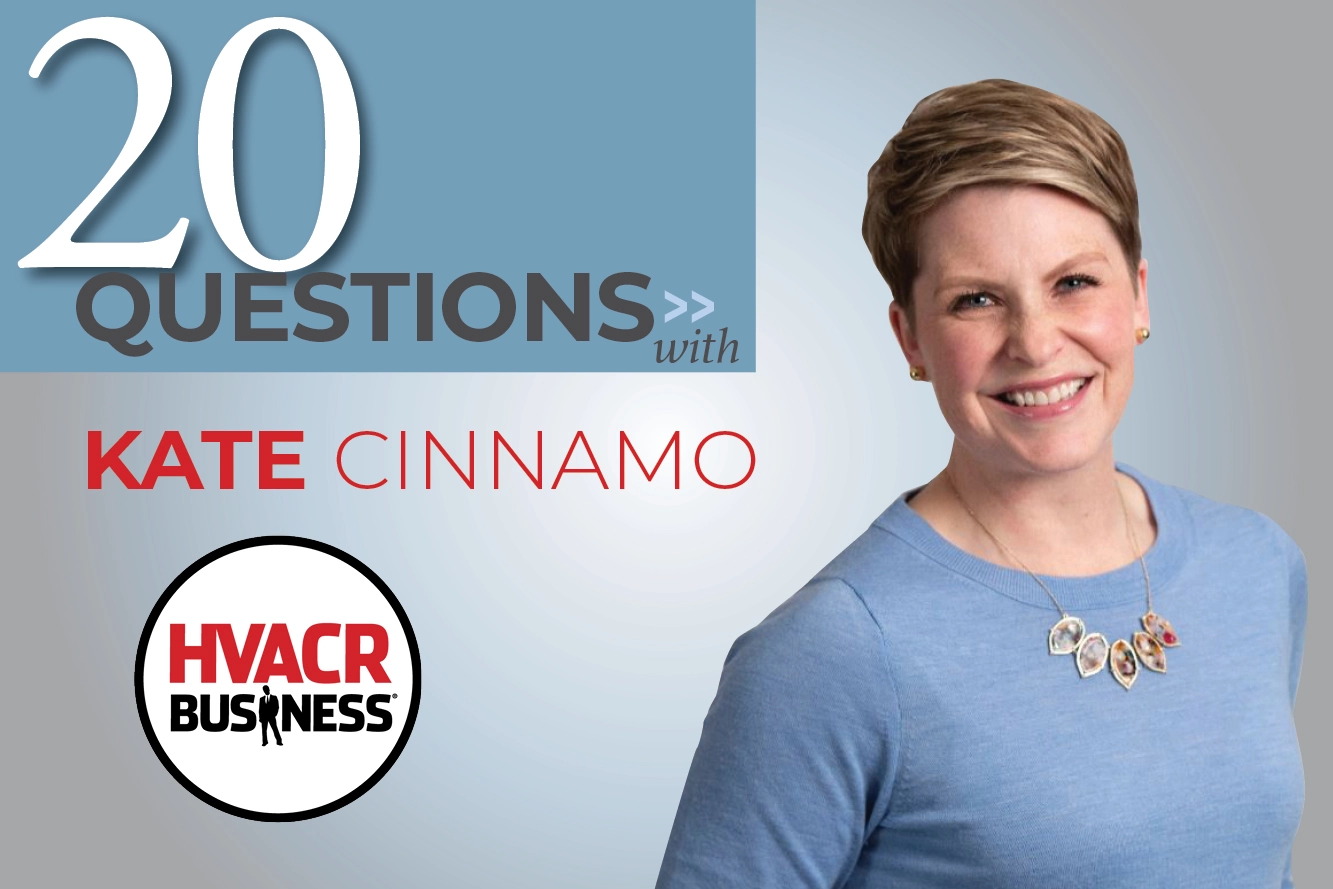HVACR Business Publisher Terry Tanker met with Chris Nelson President, Carrier Residential and Commercial Systems North America, at the AHRI Annual Meeting. The two discussed the military, sales and marketing, operational and strategic planning, innovation and success.
1. My dad always said?
Credibility is the toughest thing in life to build, and the easiest to lose.
2. What’s the one thing you wish you would have said yes to?
When I was first commissioned into the military I had the choice of duty station between Fort Stewart in Savannah, Georgia or Korea. I chose Fort Stewart. I’ve often thought I should have taken the opportunity to live in Korea.
3. Did you consider a military career?
Yes, I spent 4 years as an Army officer. One of my last assignments was that of a General’s Aide. I was given a unique window into the military to see how my life would look if I stayed and was very successful.
4. What changed your mind?
That job. He was a mentor and we discussed a military career. In the end, I thought I would be better suited to business. I studied science as an undergrad and didn’t have any business experience, so to gain some I took a job selling medical equipment.
5. Interesting, did you enjoy that?
Loved it. Then I wanted to broaden my horizons and thought I needed a formal business education and went back to get my MBA. After graduation I spent a little time as a consultant and then joined United Technologies.
6. Where did you start with Carrier?
As a project leader for a new residential cooling platform design. From there I became the general manager of our commercial unitary business. I made the jump from residential to commercial, which was vitally important to my development because they’re very different. Then I became VP of sales and marketing for both the residential and commercial businesses. I leveraged my experience in both, and was named President of Residential and Commercial Systems in North America.
7. How did you like sales and marketing?
I really enjoyed it. The key to success is understanding your customer — who they are, what they want, and how to make them happy. Sales drove that into me. You can worry about a hundred different things, but until you convince somebody to buy your product nothing else matters.
8. Do you have a typical day? If so how do you allocate it?
No I don’t, but if I were to pull back to the highest level, I try to spend the majority of my time working with my leadership team on the issues they consider most important.
9. How do you strategically plan the year?
First, there is an operational plan. It’s a 12-month outlook: budget, financial goals, key programs, etc. When we take a step back to plan strategically, we review what’s happening in the business, the marketplace and technology. Then we decide on a direction.
10. What aspect of managing do you excel at?
Fostering a healthy level of interaction, debate and discussion on the overall direction of the business. I don’t think an engineer should just worry about engineering. I don’t think that a marketer should just worry about marketing. Everyone needs to think about the business as a whole.
11. What facet of managing is most satisfying to you?
Two things. Seeing people I work with successful in their jobs, or better yet, ultimately in bigger jobs. Two, the satisfaction of competing and winning.
12. What’s the best business advice someone gave you?
Never tell a team how you want them to do something. Tell them where you want them to end up and you’ll be amazed at the number of different ways they can figure out how to get there.
13. How do you manage?
I prefer to manage topically. If we all have aligned objectives and know where we’re going, I want to work with the team to understand how we’re getting there, where we are and what the challenges are, as opposed to being bogged down in the process.
14. What’s your leadership philosophy?
It’s very much developed by experience, but I try to lead by doing and being involved. However, it’s a fine line. Too much doing is micromanaging.
15. Do you have managerial advice you can share?
A very senior UTC person once told me, “If people would worry more about doing the job they’re doing right now, as opposed to figuring out the next job they’d like, and how they’re going to get there, they would ultimately do a better job, and the next job would come looking for you.”
16. Do you prefer the commercial or residential business more?
What I enjoy most is their differences. The adrenaline rush of residential is tough to replicate because it’s in people’s homes, it’s big numbers, it’s recognizable, it’s consumer brands, it’s solutions that are scalable.Commercial is exciting because each situation is different. It’s the Apollo 13 analogy. You see what you have to work with, and you determine the best solution for the application.
17. What do you hold on to that you probably should let go?
You can probably see by my grin that there are definitely things that fit that description. I can tell you from my perspective I really, really enjoy the product strategy part of the business and some may think I stay too involved.
18. What advice do you have for contractors to help them become better leaders and managers?
I think the most important thing for all businesses is to really spend time understanding how and where you’re actually making money. What your costs are, fixed vs. variable, how much labor it takes to do a job, what does your overhead look like? Then focus on where my effort should be applied in order to support the business.
19. What is your definition of success?
When we’ve got a group that is aligned around an objective, has understanding and believes the process, then we can move forward together and excel as a team. That’s the ultimate success in my mind.
20. What are the keys to cultivate innovation in such a large company?
This is going to be a very counterintuitive answer, but my belief is that it’s discipline. You need disciplined processes for understanding marketing, technology and regulatory trends, and then a roadmap for innovation.
Terry has over 23 years of experience in the advertising and publishing industries. He began his career with a business-to-business advertising agency. Prior to forming Hutchinson Tanker Ltd. and HVACR Business in January 2006, he spent 20 years with large national publishing and media firm where he was the publisher of several titles in the mechanical systems marketplace.
In addition to his experience in advertising and publishing, Terry has worked closely with numerous industry-related associations over the years including AHRI, AMCA, and ABMA. He has also served on the Board of Directors for the American Boiler Manufactures Association (ABMA) and as chairman, for both the Associates Committee and the Marketing Communications Committee of ABMA.






